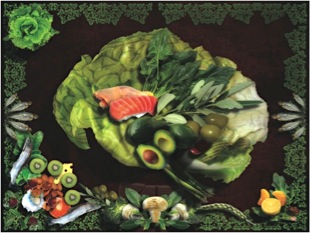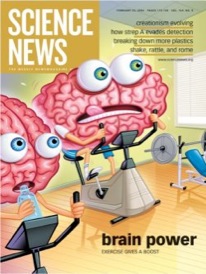


Our ongoing research at UCLA NeuroLife Lab has a strong focus in diet and exercise and the lifestyle factors that influence mental and physical health through these avenues. The mechanisms by which environmental factors affect neuronal health prove to be very important for individual health. As we have found that physical activity, learning, and nutritional factors control neurotrophins in the brain, exciting possibilities have opened up that regulation of trophic factors by behavior can be a pivotal mechanism by which specific experiences can impact the structure and function of the Central Nervous System (CNS). This has implications for the improvement of CNS functions after trauma provided by rehabilitative therapies, as well as explaining decay in function during aging or degenerative diseases following a lack of stimulation.
Our Research Interests Include:
Omega-3 fatty acid (i.e. DHA)
We are currently researching how
omega-3
fatty acids can assist in improving
cognition,
increasing synaptic plasticity, and
support
brain repair after traumatic brain
injury.
We have found that the increased
consumption
of DHA resulted in higher learning abilities,
by
s
timulating the
hippocampus.
Curcumin
In
our research, we have found that the inclusion of curcumin in a test subject's
diet served to offset the negative effects of traumatic brain injury, reducing
oxidative damage and increasing the levels of proteins in the brain that are
associated with lower levels of stress.
Exercise
We are currently conducting research as to how
exercise combined with diet control can positively
impact the brain, with and without injury.
Research suggests that exercise increases plasticity
in both injured and uninjured nervous systems.
Traumatic
Brain Injury
We
are currently conducting research as how to slow down, or restrict the
advancement of damage through dietary supplements and exercise. We have found
that dietary supplements such as curcumin and DHA in combination with exercise
can help slow down the negative effects of traumatic brain injury.
Spinal
Cord Learning
We
are conducting research as to whether the spinal cord can learn on its own,
independently from the brain (this independence is created by severing the ties
between the brain and spinal cord).

Latest publications from our lab
The salutary effects of DHA dietary supplementation on
cognition, neuroplasticity, and membrane homeostasis after brain trauma.
J Neurotrauma. 2011, Aug 18. [ Abstract ]
J Neurotrauma. 2011, Aug 18. [ Abstract ]
Exercise influences hippocampal plasticity by modulating
brain-derived neurotrophic factor processing.
Neuroscience. 2011, 192:773-80. [Abstract]
Neuroscience. 2011, 192:773-80. [Abstract]
The influence of dietary factors in central nervous system plasticity and injury recovery.
PM R. 2011, 3(6 Suppl 1):S111-6. [Abstract]
The influence of naturalistic experience on plasticity
markers in somatosensory cortex and hippocampus: effects of whisker use.
Brain Res. 2011, 1388:39-47. [Abstract]
Brain Res. 2011, 1388:39-47. [Abstract]
Brain and spinal cord
interaction: a dietary curcumin derivative counteracts locomotor and cognitive
deficits after brain trauma.
Neurorehabil Neural Repair. 2011, 25(4):332-42. [Abstract]
Neurorehabil Neural Repair. 2011, 25(4):332-42. [Abstract]
The combined effects of exercise
and foods in preventing neurological and cognitive disorders.
Prev Med. 2011 Jun 1;52 Suppl 1:S75-80. [Abstract]
Prev Med. 2011 Jun 1;52 Suppl 1:S75-80. [Abstract]
Exercise impacts brain-derived
neurotrophic factor plasticity by engaging mechanisms of epigenetic
regulation.
Eur J Neurosci. 2011, 33(3):383-90. [Abstract]
Eur J Neurosci. 2011, 33(3):383-90. [Abstract]
Contact Us:
Fernando Gomez-Pinilla, Ph. D.
Professor, Dept. of Neurosurgery and
Dept. of Integrative Biology and Physiology
University of California at Los Angeles
Life Science Building 4117
621 Charles E. Young Drive South
Los Angeles, CA 90095
Office: Phone/Fax:(310) 206-9693
Lab:(310) 825-1788










